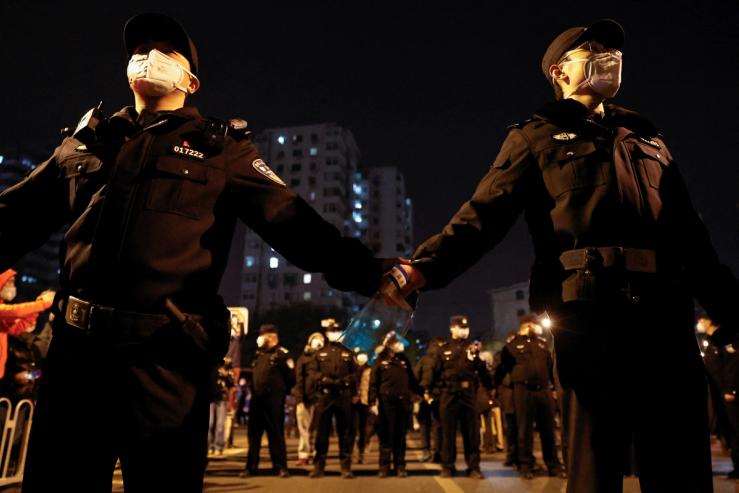The News
China doubled down on protesters across the country after a weekend of demonstrations, ramping up police patrols in key demonstration areas, checking mobile phones for virtual private networks (VPNs), and making arrests.
Online, censorship was noticeably stronger.

In this article:
Know More
The crackdown on protesters marks a turning point in the largest civil disobedience movement China has seen since Xi Jinping took office a decade ago.
While small-scale protests are not out of the ordinary, demonstrations that span cities across China and transcend the country’s Great Firewall online are extremely rare.
Videos over the past few days — that Semafor could not independently verify — have showed police exercising some restraint, standing on the sidelines as protesters led vigils and chants.
But the tone of the protests quickly changed. In cities like Shanghai, Beijing, and Hangzhou, police patrol has visibly increased, according to multiple reports.
Posts on social media showed authorities occupying areas where demonstrations took place. In these, security officials appeared to check mobile devices for foreign apps, such as Telegram.
In a video on Twitter, a woman appeared to be forcibly taken away by several police officers in front of an upscale mall in Hangzhou.
Step Back
The weekend’s protests took place against the backdrop of mounting frustrations over China’s “zero-COVID” strategy.
A fire that killed 10 people in the city of Urumqi in western China’s Xinjiang region last Thursday sparked outrage among Chinese residents, who believe that rescue efforts were stalled by lockdown measures.
Chinese authorities have repeatedly denied this claim.
Behind closed doors, health authorities relaxed some COVID-19 measures, and said they would expand a vaccination drive among the elderly, who make up a growing proportion of the country’s population.
According to the Washington Post, one district in the southern economic hub of Guangzhou announced that it would exempt elderly residents, students, and people who worked from home from mass testing unless they were entering public venues.
In Beijing, officials vowed to not lock down buildings for 24 hours at a time.
Expert’s View
The slow initial response from state censors and security forces suggest that there are some cracks in China’s all-knowing intelligence regime — and that shortcomings may worsen over time as Xi Jinping’s dominance encourages nationalist groupthink within China’s security apparatus.
“If no changes are made,” Matt Brazil, a former U.S. diplomat based in China, writes in SpyTalk, “China’s leaders could be left unable to see the forest for the trees.”

